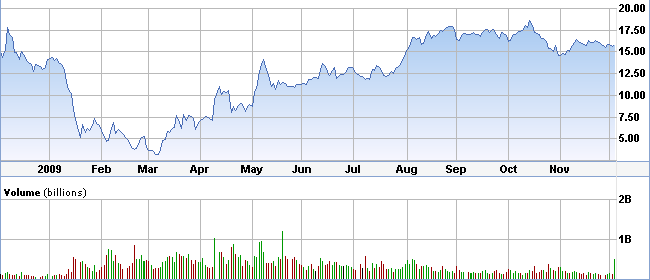美利坚银行要还钱了:好事还是坏事?
美利坚银行因为实在是找不到一位愿意在薪水加奖金上低就的人,来接替即将离职的CEO。
在实在是没有办法的情况下,想先将就着将借政府的450亿美元还掉。只有还了这笔政府债务之后,它才能够想怎么付钱给它的老总就怎么付,没有人能够管得着。
对于国家,这当然是件好事,纳税人少了一笔巨款的风险,虽然也少在这笔巨款上赚高达10%的年利息,也就是每年纳税人少得45亿美元。
对于美利坚银行,一方面是节省了这笔45亿美元的利息开支,但同时,却导致了必须多支付管理层的结果,股东不得不为此埋单。
表面上看,似乎是,银行有能力付清应该是一件好事,同时也节省了45亿美元的开支。既省钱又表明了实力,很多人就是以此为基础来看涨BAC的股票,股价也因此而在富国银行下跌时开涨。
问题是,这样的结果就是股东股份是稀释,同时,银行自己到底是已经有能力,还是实在是没有办法必须这样做?
对比富国银行不着急的态度,看来,美利坚银行“没有办法之下的选择”的成分更重一些。
这种勉为其难的做法,对于股东到底是件好事还是件坏事?大家可以琢磨一下。
【附录】Wall Street Cheers BofA TARP Move And Looks To Who Is Next
12/3/09,By Brendan Conway ,DOW JONES NEWSWIRES
NEW YORK (Dow Jones)--Wall Street breathed a sigh of relief Thursday morning after news of Bank of America Corp.'s (BAC) agreement to repay $45 billion in federal bailout funds, with most analysts calling the deal a sign that government interventions are near an end for at least one major bank.
Now, some analysts are looking ahead to see which other large financial companies may be next to repay funds borrowed under the Troubled Asset Relief Program. Pressure on firms including Wells Fargo & Co. (WFC) and PNC Financial Services Group Inc. (PNC) is now likely to ratchet up, analysts said, though some stressed the expectation that they follow up is premature in at least some cases.
Wells Fargo doesn't appear to be pursuing repayment as aggressively as Bank of America, analysts at Sanford C. Bernstein & Co. said. They predicted the company could potentially "earn out" of its bailout debt in a few quarters.
"We caution against a rigid read-across of the BofA situation to all other TARP banks," Bernstein wrote in a note to clients.
One key for Wells Fargo will be how the government takes into account the impact on earnings of acquisitions banks have undertaken since the financial crisis erupted. Those acquisitions can enhance long-term earnings but may also make it harder to pay back the government in the near term.
Citigroup called the government's treatment of acquisitions "a huge swing factor," along with whether authorities apply differing standards for capital levels at different banks.
Citi's analysts wrote that they think Bank of America and J.P. Morgan Chase & Co. (JPM) are "held to a higher standard" when it comes to capital levels.
A Wells Fargo spokeswoman said in an email, "We will work closely with our regulators to determine the appropriate time to repay the government's investment in Wells Fargo while maintaining strong capital levels."
At least two firms upgraded Bank of America's stock in the deal's wake. Calyon Securities analyst Mike Mayo, noted for prescient bearish calls on banks in the financial crisis and in the 1990s, and FBR Capital Markets each raised the shares to an outperform rating.
At least one firm said it now expects Bank of America will fill its executive suites sooner rather than later. The bank has run into a series of roadblocks replacing outgoing chief executive Kenneth Lewis, who is expected to step down at the end of the year.
Being freed of government executive-compensation restrictions could mean a new top executive at Bank of America "potentially before year-end," FBR Capital said.
The immediate impact on shareholders of the deal's $18.8 billion in new equity--which might be expected to dilute the value of their stock--was disputed.
Credit Suisse and Goldman Sachs analysts said they expect the new shares to dilute shareholders by about 10%. But others said the dilutive impact of the new stock would be offset by money saved in dividend payments to the government.
Most seemed to consider any shareholder dilution as secondary, though.
The deal "relieves the intense regulatory and political scrutiny tied to its receipt of government money," Credit Suisse analysts wrote, and for that reason should be considered a positive.
Shares of Bank of America were up 2.4% to $16.03 in recent trading.







